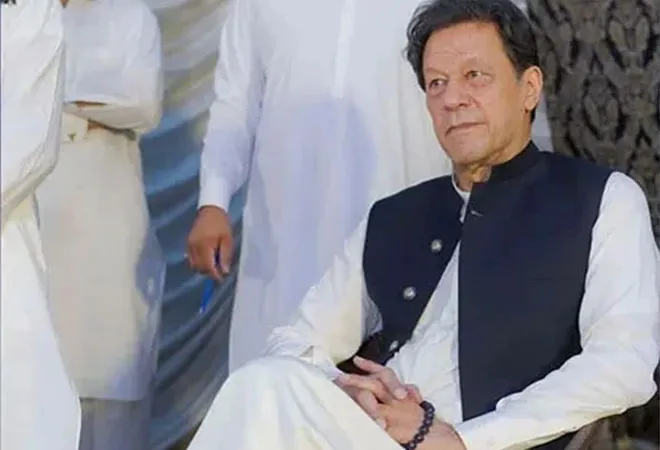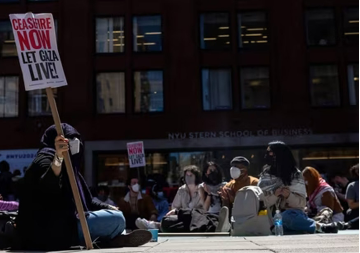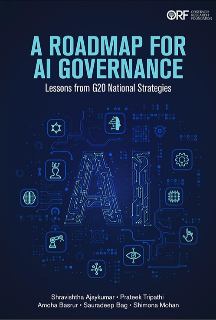 This brief is part of the series, Pakistan: The Unravelling
This brief is part of the series, Pakistan: The Unravelling
Is it curtains for Imran Khan or can he become the comeback kid? In politics, no one can or should ever be written off, and in Pakistan, even less so. Nawaz Sharif came back from virtual oblivion twice and there is a good chance he might make another comeback for a fourth term as Prime Minister. Each time he was ousted, no one thought he would bounce back, but he did. Same with Benazir Bhutto who, if she hadn’t been assassinated, was all set to become the Prime Minister for the third time in 2008. Political leaders and parties that had fallen foul of the military establishment have invariably inveigled or manipulated their way back into the centre-stage of politics.
Can Imran do the same? After all, hardly anyone thought he would be the central pole of Pakistan’s politics after his ouster from office in a no-confidence vote. But for over a year, he has roused, rallied, and roiled his supporters, and left the incumbents and their backers in the military scratching their heads on how to handle him and put him in his place. The events of 9 May have, however, given the government and the military the handle they were looking for. They have now pulled out all stops to dismantle his party, denude it of all support, and plans are afoot to disqualify him, and if necessary, put him in the dungeon. For Imran to recover from this crackdown and regain power looks well near impossible, for now at least. Only a miracle, or a Black Swan event, can bring him back to power.
Political leaders and parties that had fallen foul of the military establishment have invariably inveigled or manipulated their way back into the centre-stage of politics.
Bad blood with the military brass
The objective political conditions and power dynamics make a second innings for Imran Khan extremely unlikely. With the Pakistan Army going all out to re-assert, re-establish, and re-affirm its primacy in Pakistan's political structure, Imran will not be allowed to make a comeback anytime soon, if at all. The biggest factor going against him is the current Army leadership. The Army chief, General Asim Munir, has a lot of bad blood with Imran. Other top Army officers, including the Inter-Services Intelligence chief Lt. General Nadeem Anjum and his deputy Major General Faisal Naseer, are also not going to cut any slack for Imran. If anything, they will do everything to ensure he is not in play.
General Asim Munir will command the Pakistan Army until at least November 2025. If he gets an extension, he will be in the saddle until November 2028. Given the way Imran has personalised the conflict with him and targeted him, he cannot expect any forgiveness. Munir and the other generals know that Imran Khan is a vicious and vindictive person who will want to exact his revenge if he ever regains power. Regardless of his efforts to woo the military, after he realised how horribly wrong things have gone, no man in epaulettes will ever take Imran on his word, even less so given his proclivity to make U-turns and contradict his own stand according to convenience.
With the Pakistan Army going all out to re-assert, re-establish, and re-affirm its primacy in Pakistan's political structure, Imran will not be allowed to make a comeback anytime soon, if at all.
Thin line between anti-Army and anti-State
The negative personal equations aside, the Army brass is also quite incensed with the way Imran politicised the military and tried to sow divisions in its rank and file. That he polarised the country and split it right down the middle was bad enough, to do the same in the military was unforgiveable. Even worse, the attacks on military installations and memorials by Pakistan Tehreek-e-Insaf (PTI) activists were seen as declaring a war on the Army and the Pakistani state. The conviction in the military that Imran Khan was ready to push the country into a civil-war like situation just to grab power, and that he was involved in the entire planning to instigate violence on the streets of Pakistan, makes his unacceptability to the Army a slam-dunk.
The campaign of calumny and disinformation on social media against the Pakistan Army and the Pakistani state by PTI and Imran Khan supporters in the West has soiled whatever little was left of Pakistan's image and reputation. Lobbying efforts with the United States officials and politicians and seeking the intervention of international human rights organisations and foreign governments and institutions has also shut doors on any possibility of reconciliation with Imran Khan. Add to all this, Imran’s feckless governance record, his ruinous management of the economy, and his disastrous handling of Pakistan's most sensitive foreign relations, and it is clear that there is no appetite for another Imran innings in the military establishment. Other political leaders like Nawaz Sharif or Benazir Bhutto who made a comeback had some redeeming feature; Imran has none in the eyes of the current leadership of the Pakistan Army.
Lobbying efforts with the United States officials and politicians and seeking the intervention of international human rights organisations and foreign governments and institutions has also shut doors on any possibility of reconciliation with Imran Khan.
What awaits Imran: Six options
For now, the game plan of the military establishment and its civilian collaborators is to do everything to ensure that Imran Khan does not get any look-in. His party is being decimated through desertions; his supporters are being silenced and imprisoned; his reputation and image is being tarnished by exposing his scandals and shenanigans; he is being implicated in scores of cases; and there is now every chance that he will be tried by the military courts for his involvement in the events of 9 May that the Pakistan Army, rather dramatically if also disingenuously, calls its 9/11. Beyond the immediate action against Imran, the hybrid regime will have to decide what to do about him. The options are as follows:
- Exile: If he agrees to go into exile, Imran will be a nightmare for the ‘Establishment’. He will be able to campaign freely against the military and will ground their image into dust in the West.
- Jail: Imprisonment will be harsh, but if Imran can survive it, he will remain in play. His presence in jail will be a magnet for his supporters. He will become a living martyr and a cause celebre. Justifying his imprisonment will become increasingly untenable especially since it will be seen as political victimisation.
- Disqualification: This will be a natural consequence of any conviction. But politically, it keeps Imran in the game, even if it is through remote control. He can endorse candidates and they will be entirely under his control, hardly something the regime will want.
- Ban on PTI: This is probably the most pointless of all options. A ban is easily evaded by changing the name of the party or forming a new party in which even if Imran does not have any formal role, it is under his thumb.
- Retire and Rehabilitate: Imran agrees to lie low and even stay away from politics for the foreseeable future and is eventually rehabilitated in the fullness of time. But this option is neither going to be acceptable to Imran (it is against his character) nor to Asim Munir.
- Elimination: This can either be through the judicial route or can happen in the ‘natural’ course. While this could be a tempting option for Imran’s enemies, it is also a very risky option. It could easily spiral out of control and create more problems than it solves.
Imran: Defiant, Delusional, or Deliberate
For his part, even though Imran is beginning to comprehend that he is in serious trouble, he remains defiant. It seems that he still thinks he can take on the mighty military and come out on top. Where he is coming from is difficult to say.
- It could be just simple bluff;
- It could be his indomitable will—call it obstinacy if you will—and his belief (or delusion?) about his destiny. After all, over the years, he has managed to achieve things even after he had been written off. His singlemindedness has made him something of a battering ram who ultimately gets what he wants;
- It could be that he has been convinced that divisions within the Establishment will come to the fore in his favour if he stays the course;
- It could be that he thinks the judiciary will hold firm in his favour and won’t let him come to harm;
- It could be that he is so convinced about his popularity in the masses that the military will not be able to do much against him; or
- It could be that he has decided to go out in a blaze of glory.
With Imran refusing to throw in the towel, the ball is now in the court of the hybrid regime that will have to decide how it wants to remove him from the political algebra of Pakistan. The smart money is, however, on Imran not getting a second innings, not in the foreseeable future and perhaps never.
The views expressed above belong to the author(s). ORF research and analyses now available on Telegram! Click here to access our curated content — blogs, longforms and interviews.



 This brief is part of the series,
This brief is part of the series,  PREV
PREV


